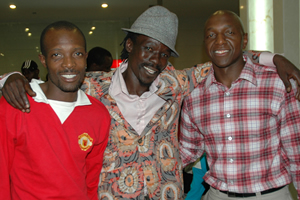Role of religion in the struggle
deliberation, speculation, interpretation and also of rejection and criticism.
From its earliest form of animism, nature-worship or totemic to that of its purest form of monotheism, religion in its broadest sense symbolises and articulates society’s most basic values and commitments.
Moreover, there is the elemental urge in man not only to live, but to live nobly.
When our passion for noble living receives cosmic backing, we have the peculiar ardour of religion. God in his infinite mercy presented to the humankind a series of informative and guiding personalities. These individuals serve to carry his message of humankind.
Many of these individuals were prophets.
One such Prophet is Abraham whose role was to eradicate the idol worshipping ideologies adopted by the people of his era, while Prophet Moses faced the injustice and slave driving Pharaoh in order to grant an oppressed nation the privilege of following the commands of God.
Prophet Muhammad completed the message by destroying ignorance and uniting people under the banner of monotheism or the oneness of God.
The responsibility placed on the shoulders of these messengers is of great magnitude, simply because they are representing truth and justice. The continuation of the message after Muhammad was the responsibility of the divine appointed successors (holy Imam).
Each and every one of these Imams, through his leadership and superb personal qualities and struggle against oppression benefited humanity in many ways.
All 12 Imams left lasting impressions on the Islamic Ummah through their endeavours, but the one Imam that has restored and raised the honour of Islam by giving it a dimension new to all people of all times is the third imam – Hussein bin Ali, the grandson of Prophet Muhammad.
The responsibility of Imam Hussein drove him to sacrifice his friends, family, wealth and life in the name of God in order to suppress oppression and tyranny and bring about justice and equity.
The Karbala incident of the Islamic history had impressed a lot to the life of Gandhi.
That was the incident of 680 BC, happened in the city of Karbala in Iraq, on the bank of river Euphrates in which the despotic Yazid mercilessly murdered Imam Hussein and 72 members of the family, with his huge army.
Undoubtedly, the positive aspects that we see in Islam today that are accepted worldwide, the sacrifice by Hussein in Karbala has great influence among them.
As Hussein moved to Karbala to save Islam along with his group of 72 persons, in the same way Gandhi too, taking inspiration from that incident, took 72 persons from different groups of the society for his salt movement. Gandhi admitted that the spread of Islam in the world is not because of the sword of the Muslim rulers but it is because of the sacrifice of the saints like Hussein.
Gandhi was so much impressed by the martyrdom of Hussein that he used to say, if he had only an army of 72 persons as like that of Hussein, he could have won the war of Indian Independence within only 24 hours.
Mahatma Gandhi (1869 -1948),pre-eminent political and ideological leader of India during the Indian independence movement.
“My faith is that the progress of Islam does not depend on the use of sword by its believers, but the result of the supreme sacrifice of Hussein, the great saint.” He used to say that if India wants to be a successful nation, it should follow the footsteps of Imam Hussein. Thus was Karbala; a brilliant torch for revolt against tyranny, a symbol for revolutionaries, a station of grief and sadness. Imam Hussein (as) emerged as a dynamic active force in Islamic history and his life a brilliant testament leaving a permanent mark on all generations.
This uprising was and remains a model for all other liberationist uprisings in the world against oppressors.
This uprising was the “big bang”, which prepared the way for a succession of revolutions and motivated those involved in the struggle to defend the sacred values of Islam and taught them the art of combating tyranny and to be steadfast in the struggle until they achieved a life of nobility and freedom.
That is why Annemarie Schimmel points out enthusiastically that Imam Husain is the leader of the lovers and the hero of freedom.
Once delivering a speech at a university in United States she, well-known international researcher on Islamic teachings, stated explicitly “Never expect to teach Muslim about freedom and human rights.
Since they have Imam Husain, the Prophet’s beloved grandson, who sacrifices himself for saving his faith and community from oppression and humiliation of tyrant.” Mrs Sarojini Naidu (1879-1949) known as The Nightingale of India, a child prodigy, freedom fighter, and poet. “I congratulate Muslims that from among them, Hussein, a great human being was born who is reverted and honoured totally by all communities.”
In relation to above-Imam Hussein attempts to unveil the human ability to be committed to the faith and reason as well as the sense of humanity.
He also provides us with great optimism and real hope that we, Homo Sapiens, have ability to manifest faith, wisdom, love, and universal human values completely in practice through all different level of our
existence.







Comments